- Home
- Cornelia Funke
Reckless
Reckless Read online
Copyright
Text copyright © 2010 by Cornelia Funke and Lionel Wigram
Illustrations copyright © 2010 by Cornelia Funke
English translation copyright © 2010 by Cornelia Funke and Lionel Wigram
All rights reserved. Except as permitted under the U.S. Copyright Act of 1976, no part of this publication may be reproduced, distributed, or transmitted in any form or by any means, or stored in a database or retrieval system, without the prior written permission of the publisher.
Little, Brown and Company
Hachette Book Group
237 Park Avenue, New York, NY 10017
Visit our website at www.HachetteBookGroup.com.
www.lb-kids.com.
Little, Brown and Company is a division of Hachette Book Group, Inc.
The Little, Brown name and logo are trademarks of Hachette Book Group, Inc.
First eBook Edition: September 2010
The characters and events portrayed in this book are fictitious. Any similarity to real persons, living or dead, is coincidental and not intended by the author.
ISBN: 978-0-316-18019-1
For Lionel, who found the door to this story and who so often knew more about it than I did, friend and finder of ideas, indispensable on either side of the mirror.
And for Oliver, who again and again tailored English clothes for this story so that the Englishman and the German could tell it together.
Contents
Copyright
1. Once upon a Time
2. Twelve Years Later
3. Goyl
4. On the Other Side
5. Schwanstein
6. Lovesick Fool
7. The House of the Witch
Go Beyond the Mirror...
1. Once upon a Time
The night breathed through the apartment like a dark animal. The ticking of a clock. The groan of a floorboard as he slipped out of his room. All was drowned by its silence. But Jacob loved the night. He felt it on his skin like a promise. Like a cloak woven from freedom and danger.
Outside the stars were paled by the glaring lights of the city, and the large apartment was stale with his mother’s sorrow. She did not wake as Jacob stole into her room, even when he carefully opened the drawer of her nightstand. The key lay right next to the pills that let her sleep. Its cool metal nestled in his hand as he stepped back out into the dark corridor.
There was still a light burning in his brother’s room—Will was afraid of the dark—and Jacob made sure he was fast asleep before unlocking the door to their father’s study. Their mother had not entered there since his disappearance, but for Jacob this was not the first time he had snuck into the empty room to search for the answers she did not want to give.
It still looked as if John Reckless had last sat in his desk chair less than an hour ago, instead of more than a year. The sweater he had worn so often hung over the chair, and a used tea bag was desiccating on a plate next to his calendar, which still showed the weeks of a passed year.
Come back! Jacob wrote it with his finger on the fogged-up window, on the dusty desk, and on the glass panels of the cabinet that still held the old pistols his father had collected. But the room remained silent—and empty. He was twelve and no longer had a father. Jacob kicked at the drawers he had searched in vain for so many nights. In a silent rage, he yanked the books and magazines from the shelves, tore down the model airplanes that hung above the desk, ashamed at how proud he had once been when his father had allowed him to paint one with red varnish.
Come back! He wanted to scream it through the streets that cut their gleaming paths through the city blocks seven stories below, scream it at the thousand windows that punched squares of light into the night.
The sheet of paper slipped out of a book on airplane propulsion. Jacob only picked it up because he thought he recognized his father’s handwriting on it, though he quickly realized his error. Symbols and equations, a sketch of a peacock, a sun, two moons. None of it made any sense. Except for the one sentence he spotted on the reverse side:
THE MIRROR WILL OPEN ONLY FOR HE WHO CANNOT SEE HIMSELF.
Jacob turned around—and his glance was met by his own reflection.
The mirror. He still remembered very well the day his father had mounted it on the wall. It hung between the shelves like a shimmering eye, a glassy abyss that cast back a warped reflection of everything John Reckless had left behind: his desk, the old pistols, his books—and his elder son.
The glass was so uneven one could barely recognize one’s own reflection, and it was darker than other mirrors, but the rose tendrils winding across the silver frame looked so real they seemed ready to wilt at any moment.
THE MIRROR WILL OPEN ONLY FOR HE WHO CANNOT SEE HIMSELF.
Jacob closed his eyes.
He turned back to the mirror.
Felt behind the frame for some kind of lock or latch.
Nothing.
Only his reflection was looking him straight in the eye.
It took quite a while before Jacob understood.
His hand was barely large enough to cover the distorted reflection of his face. But the cool glass clung to his fingers as if it had been waiting for them, and suddenly the room he saw in the mirror was no longer his father’s study.
Jacob turned around.
Moonlight fell through two narrow windows onto gray walls, and his naked feet stood on wooden floorboards covered with acorn shells and the gnawed bones of birds. The room was bigger than his father’s study, and above him cobwebs hung like veils from the rafters of a roof.
Where was he? He stepped toward one of the windows, the moonlight painting patterns on his skin. The bloody feathers of a bird stuck to the rough ledge, and far below he saw scorched walls and black hills with a few lost lights glimmering in the distance. He was in a tower. Gone were the sea of houses, the bright streets—everything he knew was gone. And high among the stars were two moons, the smaller one as red as a rusty coin.
Jacob looked back at the mirror, and in it he saw the fear on his face. But fear was an emotion he had grown to like. It lured him to dark places, through forbidden doors, and away from himself, and even the yearning for his father could be drowned in it.
There was no door in the gray walls, just a trapdoor in the floor. When Jacob opened it, he saw the remains of a burnt staircase melting into the darkness below, and for a moment he thought he spotted a tiny figure climbing up the stones. But a sudden rasp made him wheel around.
Cobwebs fell down on him as something jumped onto his neck with a hoarse growl. It sounded like an animal, but the contorted face flashing its teeth at his throat looked as pale and wrinkled as an old man’s. It was much smaller than Jacob, and as spindly as an insect. Its clothes seemed to be made of cobwebs, its white hair hung down to its hips, and when Jacob grabbed for its thin neck, the creature sank its yellow teeth deep into his hand. Screaming, he punched the attacker off his shoulder and stumbled toward the mirror. The spidery creature got to its feet again, licking his blood from its lips, but before it could reach him Jacob was already pressing his hand on the reflection of his scared face. Immediately, the scrawny figure disappeared, together with the gray walls, and behind him Jacob could once again see his father’s desk.
“Jacob?”
His brother’s voice barely registered over the beating of his heart. Jacob gasped for air and backed away from the mirror.
“Jake? Are you in there?”
He pulled his sleeve over his mauled hand and quietly opened the door.
Will’s eyes were wide with fear. He’d had another bad dream. Little brother. Will always followed him like a puppy, and Jacob protected him in the schoolyard and in the park. Sometimes he even managed to forgive Will that their mother l
oved him more.
“Mom says we shouldn’t go in there.”
“Since when do I do what Mom says? If you tell on me, I won’t take you to the park ever again.”
Jacob thought he could feel the glass of the mirror like ice on the back of his neck. Will peered past him, but he quickly lowered his head as Jacob pulled the door shut behind them. Will. Careful where Jacob was rash, tender where he was short-tempered, and calm where he was restless. Jacob took his hand. Will noticed the blood on his fingers and gave him a quizzical look, but Jacob just quietly pushed him into his room.
What the mirror had shown him was his. His alone.
2. Twelve Years Later
The sun already stood low over the burnt walls of the ruin, but Will was still asleep, exhausted from the pain that had been shaking him for days.
One mistake, Jacob, after all those years of caution.
He got up and covered Will with his coat.
All the years in which Jacob had a whole world to himself. All the years during which that strange world had become home. By the time Jacob was fifteen, he had already snuck behind the mirror for weeks at a time. When he was sixteen, he no longer even counted the months, and still he had kept his secret. Until the one time when he had been in too much of a rush. Stop it, Jacob! It can’t be changed.
The wounds on his brother’s throat had healed well, but the stone was already showing on his left forearm. The pale green veins were spreading toward his hand, shimmering in Will’s skin like polished marble.
Just one mistake.
Jacob leaned against one of the sooty columns and looked up toward the tower that housed the mirror. He had never gone through it without first making sure Will and his mother were asleep. But since she had died there had just been one more empty room on the other side, and he had been keen to press his hand against the dark glass again and get away. Far away.
Impatience, Jacob. Say it as it is. After all, it’s one of your most prominent character traits.
He could still see Will’s face appear behind him in the mirror, distorted by the dark glass. “Where are you going, Jacob?” A late flight to Boston, a trip to Europe; there had been so many excuses over the years. Jacob was just as creative a liar as his father had been. But this time his hand had already pressed against the cool glass—and Will had, of course, followed his example.
Little brother.
“He already smells like them.” Fox appeared out of the shadows cast by the crumbled walls. Her fur was as red as if autumn itself had lent her its colors, except where the trap had streaked the hind leg with pale scars. It had been five years since Jacob had freed her, and the vixen had not left his side since. She guarded his sleep, warned him of dangers that his dull human senses could not detect, and she gave advice that was best followed.
One mistake.
Jacob stepped through the arched doorway in which the scorched remnants of the castle’s main door were still hanging on the warped hinges. On the steps in front, a Heinzel was collecting acorns from the cracked stones. He quickly scampered off as Jacob’s shadow fell on him. Red eyes above a pointy nose, pants and shirt sewn from stolen human clothes. The ruin was swarming with them.
“Send him back! That’s what we came here for, isn’t it?” The impatience in Fox’s voice was hard to miss.
But Jacob shook his head. “Bringing him here was a mistake. There’s nothing on the other side that can help him.”
Jacob had told Fox about the world he came from, but she never really wanted to hear about it. What she knew was enough: that it was the place to which he disappeared far too often, only to bring back memories that followed him like shadows.
“And? What do you think will happen to him here?”
Fox did not say it, but Jacob knew what she was thinking. In her world, fathers killed their own sons as soon as they discovered the stone in their skin.
He looked down toward the foot of the castle hill, where the red roofs were fading into the twilight. The first lights were coming on in Schwanstein. From a distance, the town looked like one of the pictures printed on gingerbread tins, but over the past years, railway tracks had begun to cut through the hills beyond, and gray smoke rose from the smokestacks of factories into the evening sky. The world behind the mirror wanted to grow up. However, the petrified flesh growing in his brother had not been sown by mechanical looms or any of the other modern achievements but by the old magic that still dwelled in its hills and forests.
A Gold-Raven landed next to Will on the cracked tiles. Jacob shooed it away before it could croak one of its sinister spells into his brother’s ear.
Will groaned in his sleep. The human skin did not yield to the stone without a fight. Jacob felt the pain as his own. Only his love for his brother had made him return to the other world, even though he’d done so less and less frequently over the years. His mother had threatened him with social services, she had cried, but she had never suspected where he vanished to. Will, however, had always wrapped his arms around Jacob, eagerly asking what he had brought for him. The shoes of a Heinzel, the cap of a Thumbling, a button made of elven glass, a piece of scaly Waterman skin—Will had hoarded Jacob’s gifts under his mattress, and soon he began to regard the stories Jacob told him as fairy tales his brother invented only for him.
Now he knew how true they had all been.
Jacob pulled the coat over his brother’s disfigured arm. The two moons were already in the sky.
“Keep an eye on him, Fox.” He rose to his feet. “I’ll be back soon.”
“And where are you going? Jacob!” The vixen jumped into his path. “Nobody can help him.”
“We’ll see.” He pushed her aside. “Don’t let Will climb into the tower.”
She looked after him as he walked down the steps. The only footprints on the mossy steps were his own. No human ventured up here. The ruin was thought to be cursed, and Jacob had heard dozens of stories about its demise, but after all these years he still didn’t know who had left the mirror in its tower, just as he had never found out where his father had vanished to.
A Thumbling jumped at his collar. Jacob managed to grab him before he could steal the medallion he was wearing around his neck. On any other day, Jacob would have followed the little thief at once. Thumblings could hoard considerable treasures in the hollow trees where they built their nests. But he had already lost too much time.
One mistake, Jacob.
He would make it right again. But Fox’s words followed him as he climbed down the steep hill.
Nobody can help him.
If she was right, soon he would no longer have a brother. Neither in this world nor in the other.
One mistake.
3. Goyl
The field over which Hentzau and his soldiers were riding still reeked of blood. The rain had filled the trenches with a muddy sludge. Behind the walls both sides had built for their protection lay abandoned rifles and bullet-riddled helmets. Kami’en had the horse cadavers and the human corpses burnt before they began to rot, but the dead Goyl still lay where they had fallen. In just a few days, they would be all but indistinguishable from the rocks that protruded from the trampled earth, and the heads of those who had fought valiantly had already been sent to the main fortress, as was Goyl custom.
Another battle. Hentzau was tired of them, but he hoped that this would be the last one for a while. The Empress was finally ready to negotiate, and even Kami’en wanted peace. Hentzau covered his mouth as the wind blew the ash down from the hill where they had burnt the corpses. Six years aboveground, six years without the shelter of the rock between him and the sun. His eyes ached from all the light, and the air was again growing colder with every day, making his skin as brittle as chalk. Hentzau’s skin resembled brown jasper—not the finest color for a Goyl. Hentzau was the first jasper Goyl to have risen to the highest military ranks. But then again, before Kami’en the Goyl had never had a King, and Hentzau liked his skin. Jasper provided much better camo
uflage than onyx or moonstone.
Kami’en had set up camp not far from the battlefield, in the hunting lodge of an imperial general who, together with most of his officers, had died in the battle.
The sentries guarding the destroyed gate saluted as Hentzau rode past them. The King’s bloodhound. That’s what they called him. His jasper shadow. Hentzau had served under Kami’en since they had first challenged the other chiefs. It had taken two years for them to kill them all, and for the Goyl to get their first King.
The drive leading up to the lodge was lined with statues, and not for the first time did Hentzau note with amusement how humans immortalized their gods and heroes with stone effigies while loathing his kind for their skin. Even the Doughskins had to admit it: Stone was the only thing that lasted.
The windows of the lodge had been bricked up, just as in all the buildings the Goyl had occupied, but only when he descended the steps to the cellars did Hentzau finally feel the soothing darkness that could be found belowground. Just a few gas lamps lit the vaults that now housed, instead of supplies and dusty trophies, the general staff of the King of the Goyl.
Kami’en. In their language, it meant nothing more than “stone.” His father had governed one of the lower cities, but fathers did not count among the Goyl. It was the mothers who raised them, and by the age of nine Goyl were considered grown up and had to fend for themselves. At that age, most of them went to explore the Lower World, searching for undiscovered caves until the heat became too much even for their stone skins. Kami’en, however, had been interested only in the world above. For a long time, he had lived in one of the cave cities that had been built above-ground after the lower cities had become too crowded. There, he had survived two attacks by the humans, and that’s when he began to study their weapons and their tactics, snuck into their towns and military camps. He was nineteen when he conquered his first human city.
The guards waved Hentzau in. Kami’en was standing in front of a map showing his conquests and the positions of his enemies. The figurines representing their troops had been made to his specifications after he’d won his first battle. The Goyl were carved from carnelian, the imperials were cast in silver, Lotharaine wore gold, the eastern lords donned copper, and Albion’s troops marched in ivory. Soldiers, gunners, snipers, riders for the cavalry. Kami’en scrutinized them as if he were searching for a way to beat them all at once. He was wearing black, as he always did when he was out of uniform, and more than ever his pale red skin seemed to be made of fire. Never before had carnelian been the color of a leader. Onyx was the color of the Goyl elite.

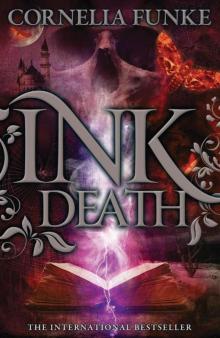 Inkdeath
Inkdeath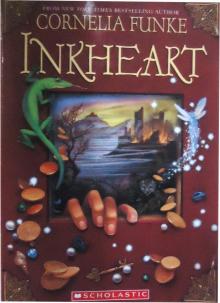 Inkheart
Inkheart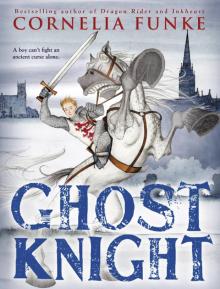 Ghost Knight
Ghost Knight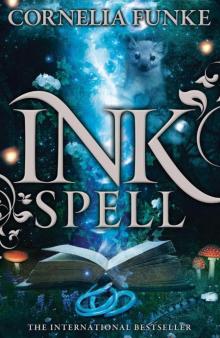 Inkspell
Inkspell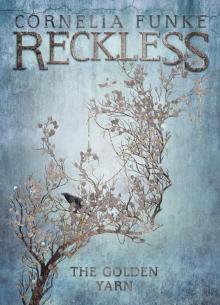 The Golden Yarn
The Golden Yarn Fearless
Fearless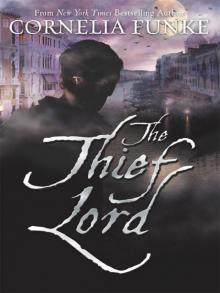 The Thief Lord
The Thief Lord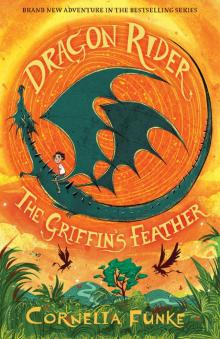 The Griffin's Feather
The Griffin's Feather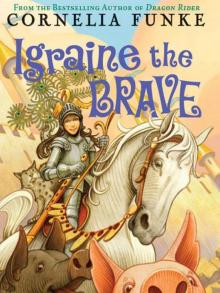 Igraine the Brave
Igraine the Brave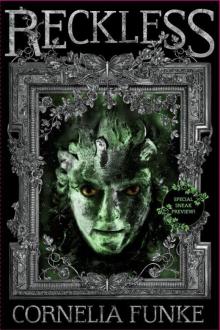 Reckless
Reckless When Santa Fell to Earth
When Santa Fell to Earth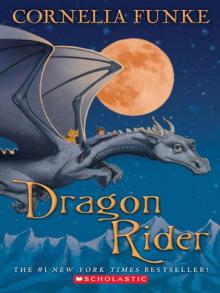 Dragon Rider
Dragon Rider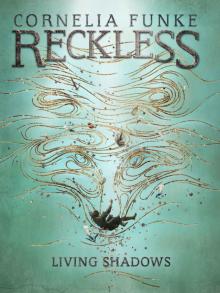 Living Shadows
Living Shadows Lilly and Fin: A Mermaid's Tale
Lilly and Fin: A Mermaid's Tale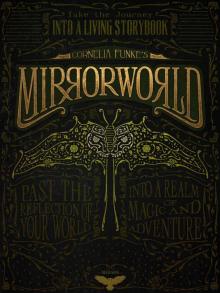 The MirrorWorld Anthology
The MirrorWorld Anthology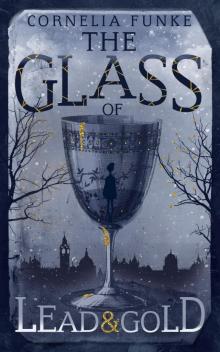 The Glass of Lead and Gold
The Glass of Lead and Gold Ghosthunters and the Incredibly Revolting Ghost
Ghosthunters and the Incredibly Revolting Ghost Ghosthunters and the Totally Moldy Baroness!
Ghosthunters and the Totally Moldy Baroness!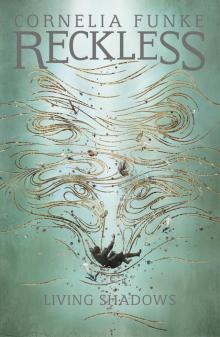 Reckless II
Reckless II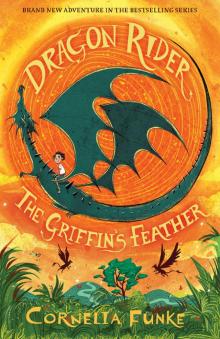 Griffin's Feather
Griffin's Feather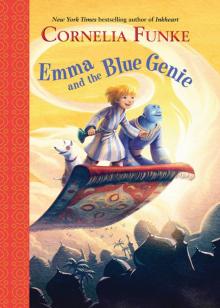 Emma and the Blue Genie
Emma and the Blue Genie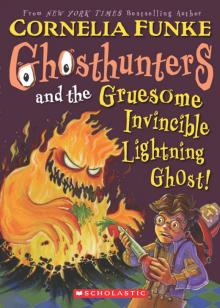 Ghosthunters and the Gruesome Invincible Lightning Ghost
Ghosthunters and the Gruesome Invincible Lightning Ghost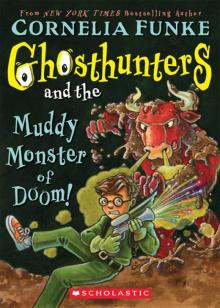 Ghosthunters and the Muddy Monster of Doom!
Ghosthunters and the Muddy Monster of Doom! Inkheart ti-1
Inkheart ti-1 The Pirate Pig
The Pirate Pig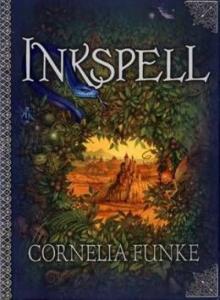 Inkspell ti-2
Inkspell ti-2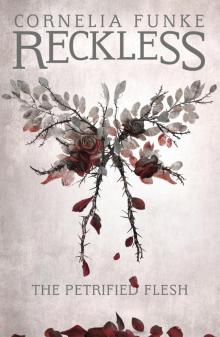 The Petrified Flesh
The Petrified Flesh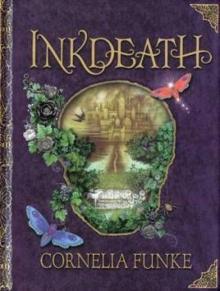 Inkdeath ti-3
Inkdeath ti-3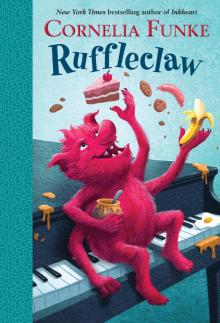 Ruffleclaw
Ruffleclaw Lilly and Fin
Lilly and Fin